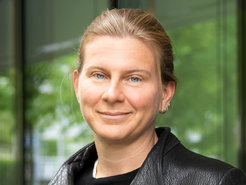New Director at the Max Planck Institute for Biology of Ageing
Anne Schaefer explores the ageing brain
International top researcher Anne Schaefer will start as the new director of the Max Planck Institute for Biology of Ageing in October 2021. Born in Germany, she is currently working in New York at the "Icahn School on Medicine at Mount Sinai" and studying the mechanisms responsible for the longevity of nerve cells in the brain. With her research she wants to answer the following questions: What factors “drive” the brain to age? Does the ageing brain determine the ageing processes in the rest of the body? What role do external influences such as infections or inflammation play in brain ageing? To answer these questions, she is exploring the brain's resident immune cells, also called microglia, which form a link between the brain and the rest of the body.

Ageing is associated with changes in brain function and the processes that govern brain ageing are still poorly understood. With her research team, Schaefer studies the role of the brain immune cells, the so-called microglial cells, in brain ageing. "The common view of the brain creates an overwhelming picture of billions of nerve cells wired in different circuits controlling every aspect of our lives. I study the lesser-known part of the brain formed by the brain's immune cells, the microglia", Schaefer said. "Depending on their state of activity, microglia can destroy or protect nerve cells. We have discovered a special group of microglia that protects the brain from neurodegenerative processes. Microglia also provide a special link between the body and the brain due to their ability to sense molecular cues that originate in the organism periphery during infections or inflammations. All these functions of microglia play an important role in determining the longevity and function of individual neurons as well as the brain as a whole," says Dr Schaefer.
"I want to inspire young people for science”
Schaefer has headed her lab at the "Icahn School on Medicine at Mount Sinai" since 2011, and in March 2021 she accepted the appointment as Max Planck Director at the Max Planck Institute for Biology of Ageing in Cologne. From October 2021, she will start setting up her new lab. "I am incredibly excited about bringing my research to Cologne and use my most wonderful experience at the “Friedman Brain Institute at the Mount Sinai” to build an international and diverse department. I want to inspire young people to get involved in science and have a strong focus on innovation and discovery. Cologne has remarkable scientific potential both at the Max Planck Institutes for Biology of Ageing and for Metabolism Research and in neighboring institutes. I am thrilled to have the opportunity to work with many of my Max Planck colleagues with their immense expertise in different areas of the life sciences," said Schaefer. “I am also excited to have an opportunity to foster new exciting collaborations between my colleagues in Cologne and in the USA to facilitate and pursue the most innovative research”.
Adam Antebi, Executive Director at the Max Planck Institute for Biology of Ageing: " We are thrilled about Anne Schaefer joining us! She will add a completely new dimension to our institute. She is a fantastic scientist who delves into how neurons and immune cells in the brain, called microglia, communicate. As we age, this communication breaks down and contributes to functional loss and neurodegenerative disease. Insight into this process may help maintain brain health during ageing.”
About the person
Anne Schaefer comes from Offenbach near Frankfurt and studied medicine in Mainz and Berlin. In 2001, she went to the Rockefeller University in New York as a visiting student, and then returned to the Rockefeller University in 2004 as a postdoc in the laboratory of Nobel Prize winner Paul Greengard after completing her doctorate. In 2011, she started her own research group at the Icahn School of Medicine at Mount Sinai in New York, where her innovative research was recognized within a few years with a tenured professorship and the Vice Chair of the Neuroscience Department.
Learn more about the work in the Schaefer Department.












